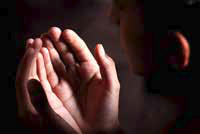

Making Du‘ā’ while in a state of Tahārah (Purity).
Both Al-Bukhāriy and Muslim reported in their Saheehs the Hadeeth of Abi Moussa Al-Ash‘ariy (ABPWH) and his story with his uncle Abi ‘Āmer (ABPWH) when the Prophet (ABPWH) sent him in lead of the army of Awttās. The Hadeeth says, “Abu ‘Āmer was killed and he asked Abā Moussa to convey his greetings to the Prophet (PBUH) , and to ask for the Prophet’s Du‘ā’ for him. Abu Moussa (ABPWH) said, ‘I told the Prophet about Abi ‘Amer’s story and request.’ Allāh’s Messenger (PBUH) then asked for water and made ablution from it. He then raised his hands and said, ‘O Allāh, I ask You for forgiveness to Abi ‘Āmer.’ Abu Moussa (ABPWH) said, ‘He raised his hands while making Du‘ā’ to the extent that I saw the whiteness of his armpits.’ The Prophet (PBUH) then said, ‘O Allāh, raise his rank on the day of judgment above many of mankind.’.” (Al-Bukhāriy no. 4323, Muslim no. 2498)
Facing the Qiblah (Direction of the Ka‘bah).
Abdullāh Ibn ‘Abbāss (ABPWH) narrated, “‘Umar Ubn Ul-Khattab (ABPWH) said, ‘When it was the day of the battle of Badr, the Messenger of Allāh (PBUH) took a glance at the Mushrikeen, who were one thousand, while his own companions were three hundred and nineteen men. The Prophet (PBUH) turned towards the Qiblah, then he extended his hands and began his supplication to his Lord, “O Allāh, accomplish for me what you have promised me. O Allāh, bring about what have promised me. O Allāh, if this small group of Muslims is perished, You will not be worshiped on this earth.” He continued his supplication to his Lord extending his hands and facing the Qiblah until his cloak slipped down off his shoulders. Abu Bakr then came to him, picked up the cloak and placed it on his shoulders, then embraced him from behind and said, “Prophet of Allāh, this prayer of yours to your Lord is sufficient, and He will fulfill for you what He has promised you.”.’.” (Muslim no. 1763)
Starting Du‘ā’ by praising Allāh, the Almighty, then asking Allāh to send peace and blessings upon his Prophet (PBUH).
At-Tirmidthiy reported through Fadhālah Ibn ‘Ubaid (PBUH) that he said, “While the Prophet (PBUH) was sitting, a man entered and prayed and then said, ‘O Allāh, forgive me and have mercy on me.’ The Prophet (PBUH) told him, ‘You were hasty. When you supplicate, praise Allāh with what He deserves and ask Him to pray on me, then ask Allāh for what you need.’.” (At-Tirmidthiy no. 3476)
Making Du‘ā’ with the ninety nine names of Allāh, the Almighty.
A person should choose the name of Allāh the meaning of which corresponds to his need. If one is asking Allāh for livelihood, it would be adequate to say, “O Allāh, The Superb Provider.” If one is asking Allāh for mercy, it would be adequate to say, “O Allāh, The Most Merciful.” If one is asking Allāh for dignity, it would be adequate to say, “O Allāh, the Almighty.” If one is asking Allāh for forgiveness, it would be adequate to say, “O Allāh, the Ever-Forgiving,” and so on.
Thus, he should supplicate with what is appropriate. Allāh Almighty says:
{ وَلِلّهِ الأَسْمَاء الْحُسْنَى فَادْعُوهُ بِهَا }
“Allāh has the most beautiful names, so call upon Him by His names ...” (Soorat Ul-A‘rāf, Verse 180)
Repetition and insistence in Du‘ā’.
Ibn ‘Abbāss (ABPWH) narrated in the Hadeeth quoted earlier, that the Prophet (PBUH) said, “O Allāh, accomplish for me what You have promised me. O Allāh, bring about what You have promised me.” He continued his supplication to his Lord, extending his hands and facing the Qiblah, until his cloak slipped down off his shoulders. Abu Bakr then came to him, picked up his cloak and placed it on his shoulders and then embraced him from behind and said, “Prophet of Allāh, this prayer of yours to your Lord is sufficient, and He will fulfill for you what He has promised you.” (Muslim no. 1763)
In the Saheehayn, Abu Hurayrah (ABPWH) narrated that the Prophet (PBUH) made Du‘ā’ for the tribe of Dawss and said, “O Allāh guide Dawss and bring them to Islam, O Allāh guide Dawss and bring them to Islam.” (Al-Bukhāriy no. 2937, Muslim no. 2524)
Imām Muslim also reports in his Saheeh, the Hadeeth about the man who would travel on a long journey and get disheveled and dusty, raising his hands to the sky saying ‘O Lord! O Lord!’ ... (Muslim no. 1015). This repetition in calling upon Allāh signifies urge and insistence.
It is Sunnah to make Du‘ā’ three times. This is taken from the Hadeeth of Ibn Mas‘oud (ABPWH) in which he narrates that the Prophet (PBUH) called upon Allāh against Quraysh three times. (Al-Bukhāriy no. 240, Muslim no. 1794)
Making Du‘ā’ in secret.
Allah Almighty said,
{ادْعُواْ رَبَّكُمْ تَضَرُّعاً وَخُفْيَةً}
“Call upon your Lord with humility and in secret. He does not like aggressors.” (Soorat Ul-A‘rāf, Verse 55)
Making Du‘ā’ in secret is closer to sincerity, and thus Allāh praised Zakariyyā when He, the Almighty, said,
{إِذْ نَادَى رَبَّهُ نِدَاء خَفِيّاً}
“When he called out his Lord in secret.” (Soorat Maryam, Verse 3)
Some scholars said that he called upon Allāh in secret because of sincerity.

What should I ask for in my Du‘ā’?
One should make Du‘ā’ to ask for whatever he wants from the matters of this world or the Hereafter. It is best to use the supplications that are reported in the Qur’ān and the Sunnah, as they include all good of this world and the Hereafter. When the Prophet (PBUH) was asked this question, he answered with great words that comprise all good of this world and the Hereafter, and what a generous gift and great glad-tiding this is for a Muslim. Thus, we need to take care of the supplications of the Qur’ān and the Sunnah and contemplate them.
Abu Mālik Il-Ashja‘iy reports through his father, may Allāh be pleased with both of them, that he narrated that a man came to the Prophet (PBUH) and said, “O Messenger of Allāh, What should I say when I call upon my Lord?” The Prophet (PBUH) said, “Say, ‘O Allāh, forgive me, have mercy on me, give me well-being and health in this life and in the Hereafter, and give me sustenance.’,” and the Prophet (PBUH) put together his fingers except the thumb and said, “This supplication gives you the good of both this life and the Hereafter.” (Muslim no. 2697)
In another narration, it is reported that when someone converted to Islam, the Prophet would order him to use say words for supplication, “O Allāh, Forgive me, show mercy upon me, guide me, give me well-being, and give me sustenance.” (Muslim no. 2697)
It is Sunnah to pray for your brother in his absence.
It is Sunnah to pray for your brother in his absence, which is an accepted Du‘ā’ by the will of Allāh. One who does this is greatly rewarded. Imām Muslim reported in his Saheeh through Abi d-Dardā’ (ABPWH) that the Prophet (PBUH) said , “The Du‘ā’ of a person for his Muslim brother in his absence is an answered one. At his head there is an appointed angel, and every time he prays for his Muslim brother, the angel says, ‘Āmeen, may you have likewise.’.” (Muslim no. 2733)




